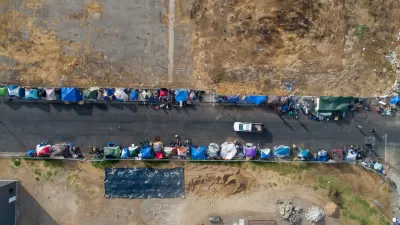Should architects recuse themselves from designing buildings that violate human rights? Raphael Sperry says yes, especially when it comes to two building types that are ethically troublesome: execution chambers and supermax prisons.
Sperry, president of Architects/Designers/Planners for Social Responsibility (ADPSR), pens an opinion piece for The Architect's Newspaper in which he calls for the AIA to amend its Code of Ethics and Professional Conduct to prohibit the design of “buildings that violate human rights.” He bases his call on two specific (and rare) building types: execution chambers and supermax prisons.
"Consider that doctors, nurses, psychologists, anesthesiologists, and many other medical professionals have specifically amended their ethics codes to prohibit participation in executions or any act of torture. The World Medical Association code even states, 'The physician shall not provide any premises, instruments, substances, or knowledge to facilitate the practice of torture.'”
"Does the public expect anything less from architects who 'provide premises' as our basic public service? Does our obligation to protect public 'health, safety, and well-being' not include, as a bare minimum, a commitment to stop making places where—admittedly despised—members of the public will be killed or tortured?"
"What’s at stake here is not just the tiny number of contracts for these building types," Sperry argues, "but architects’ professional commitment to public well-being."
FULL STORY: AIA Must Do More For Human Rights

Maui's Vacation Rental Debate Turns Ugly
Verbal attacks, misinformation campaigns and fistfights plague a high-stakes debate to convert thousands of vacation rentals into long-term housing.

Planetizen Federal Action Tracker
A weekly monitor of how Trump’s orders and actions are impacting planners and planning in America.

In Urban Planning, AI Prompting Could be the New Design Thinking
Creativity has long been key to great urban design. What if we see AI as our new creative partner?

Portland Raises Parking Fees to Pay for Street Maintenance
The city is struggling to bridge a massive budget gap at the Bureau of Transportation, which largely depleted its reserves during the Civd-19 pandemic.

Spokane Mayor Introduces Housing Reforms Package
Mayor Lisa Brown’s proposals include deferring or waiving some development fees to encourage more affordable housing development.

Houston Mayor Kills Another Bike Lane
The mayor rejected a proposed bike lane in the Montrose district in keeping with his pledge to maintain car lanes.
Urban Design for Planners 1: Software Tools
This six-course series explores essential urban design concepts using open source software and equips planners with the tools they need to participate fully in the urban design process.
Planning for Universal Design
Learn the tools for implementing Universal Design in planning regulations.
Gallatin County Department of Planning & Community Development
Heyer Gruel & Associates PA
JM Goldson LLC
City of Camden Redevelopment Agency
City of Astoria
Transportation Research & Education Center (TREC) at Portland State University
Jefferson Parish Government
Camden Redevelopment Agency
City of Claremont





























